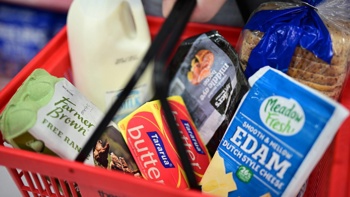Kiwi friendliness has helped one family move on from the atrocities of Syria to their new-found home.
This Saturday marks a year since the first thirteen Syrian families arrived in Dunedin to a cacophony of applause and cheers from local Red Cross support staff and members of the local iwi and wider community.
For Manahel Haroura, 29, and her three children, the initial wave of support and cheer made her feel very welcome, but those feelings were soon replaced by the fear of the unknown.
Speaking through a translator, Haroura said there were a number of different elements she and her family had to adjust to.
"The traditions are different, the language is different, the system is different - and the weather is different."
Such an immediate culture shock and a cooler climate made the initial stages of adjusting to Kiwi life less like 'Sweet As', and more like sweaters.
For Haroura, figuring out public transport, discovering what public services are available, and calculating what food you can buy, and the clothes you can purchase were a struggle.
Those difficulties made for slow beginnings, which were exacerbated by wandering thoughts of family left behind, and the sacrifices individuals have had to make for the safety of their own family. Haroura's mother, sister and brother remain in war-torn Syria.
"It is definitely difficult and you would be physically in one place and thinking about another place," Haroura added. "But if you continue thinking about what you have lost and reflect on the past, you will never be able to move forward."
That does not mean to say the 29-year-old mother of three abandons memories of her home country. Far from it. However, while Syria continues to be on the minds of all those who have fled the atrocities, the details continue to make for disturbing listening.
"We constantly think about that. All of the families here have families back home."
"Sometimes I don't watch anything because [the events] are very sad. My country is very bad."
She yearns for the day her siblings will travel to New Zealand to see and support her two daughters Nada, 14, Huda, 12, and four-year-old son Abdulhadi. All three are doing well at school and pre-school, and are picking up the language quickly.
"Once you see that the kids are going to school, it's safe, they're learning heaps and they're thriving. Also when you as an adult are learning and adjusting, you can see those milestones and success stories, so it becomes easier."
A year has passed, and the Haroura family have had many situations to navigate. They have become a lot more familiar with the public transport system, and the language barrier is slowly easing thanks to school, and in Haroura's case, English classes at Otago Polytechnic.
Kiwis have also made the resettlement process easier, and Haroura was quick to point out the incredible services of the New Zealand Red Cross, and the countless resettlement co-ordinators, volunteers, case workers, and people behind the scenes.
"It's not just about feeling comfortable, but belonging, because people are kind and caring and make you feel like you belong."
Does she feel like a Kiwi a year on? The honest answer is not yet. There's more English to learn, processes to get her head around, and one other quirk that the warm Kiwi welcome cannot overcome - the Dunedin climate.
"It wasn't difficult to acclimatise because we had days in Dunedin that were like cold days in Syria - but it never ends here."
"In the Middle East, you have distinct seasons, but here in Dunedin winter is everlasting."
Take your Radio, Podcasts and Music with you









